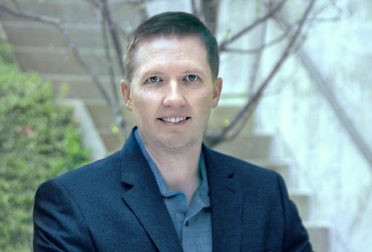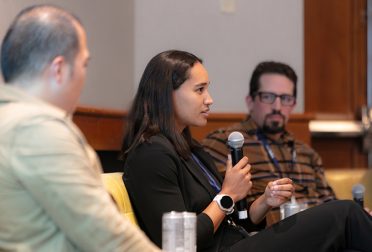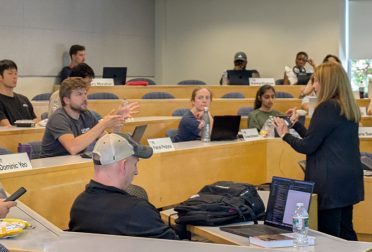[Note: This piece was compiled from observations and reports by Abhay Chauhan, Rita Uganden-Teryila, and Sai Prasad Balla.]
SDM launched a new series of events this spring that brought leaders and innovators to MIT in order to share their experiences. The Systems Forum series offered students the chance to hear from experts in a variety of fields about how they are facing their industries’ most important system challenges. These events were open to the campus community, bringing undergraduate and graduate students together with SDM’s cohort of experienced mid-career fellows to hear ideas and exchange knowledge on the importance of a systems approach to a wide range of problems.
Common themes emerged throughout the series. Daniel Moczydlower, president and CEO of Embraer-X, brought up the challenges of exploring new technologies and embracing change in his talk on February 16. Embraer-X is the incubator and market accelerator of the world’s third largest aircraft manufacturer. Daniel emphasized the importance of adapting to the rapid transformations of the aviation industry beyond their existing competitors: “New players may come and challenge us. Tomorrow, Tesla, Google, or any other new player could launch a competitive product in the aviation market.” He also noted the importance of Embraer-X’s support of disruptive technologies while leveraging their core business strength. This resonated with SDM’s philosophy that integrates systems thinking with technical and business expertise.
Jason Zander, executive vice president of Strategic Missions & Technologies at Microsoft, expressed similar insights at his talk on April 12. “Change is going to keep happening no matter what,” he began, discussing the importance of flexibility and embracing change over his 32 years at Microsoft. Jason began as an engineer before moving through leadership roles in developer tools and Azure. Now he leads teams of engineering and field organizations working the future of cloud computing, including quantum computing, telecommunications, and mission engineering. Hearing about the nuances of change from an industry veteran who has seen and successfully navigated these transformations helped our students appreciate the value of embracing rather than resisting change.
Another theme that emerged during the series was the importance of mitigating variables through seeking commonality. Rear Admiral Chad Jacoby, SDM ’14 and an assistant commandant for acquisition with the U.S. Coast Guard, brought this topic to the forefront in his talk on April 2. As a key player in the acquisition process, Chad emphasized the importance of a system architecture when strategizing for the years ahead. As an example, encouraging competition among shipbuilders helped build the goal of commonality into the design process. By focusing on a set of key systems, “that prompted them to make some critical architectural decisions,” he said. Shipbuilders were empowered to select the elements that would be shared in common, a flexible approach which helped reduce the overall program’s cost while still allowing for decisions to be made based on the best design. Similarly, Thomas Grohs of Airbus spoke about the importance of common design elements during his talk on May 16. As the Head of Future Capabilities, he discussed how autonomous and connected technologies are leading the way towards safer, more efficient and interoperable flight, which is far more than building individual assets.
We look forward to hosting more Systems Forums in the future and welcoming alumni and industry leaders to share their thoughts on how they tackle systems challenges in their fields through a combination of engineering and management skills. Just as Jason Zander encouraged the audience to have a growth mindset, these events serve to remind students that after they graduate and return to work, they should be open to sharing knowledge and continuing to learn.




